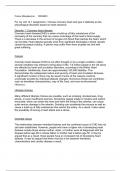Pranav Dileepkumar. 19096830
For my unit 14.1 assignment, I choose coronary heart and type 2 diabetes as the
physiological disorders based on heart research.
Disorder 1: Coronary heart disease
Coronary heart disease(CHD) is when a build-up of fatty substances of the
narrowing of the coronary that can cause a blockage of the heart’s blood supply.
There is a decrease in the amount of oxygen-rich blood that reaches the heart, which
can be fatal. Heart attacks typically arise from significant blockages in blood vessels
caused by plaque buildup. A person may suffer from them at great risk and with
great suffering.
Causes
Coronary heart disease (CHD) is not often brought on by a single condition; rather,
several variables may interact to bring about CHD. 7.6 million people in the UK alone
are affected by heart and circulation disorders, according to the British Heart
Foundation. Additionally, there are approximately 163,000 fatalities. This
demonstrates the widespread nature and severity of heart and circulation illnesses.
A significant number of lives may be saved if some of the reasons could be
universally avoided by individual attitude changes. Numerous things can contribute,
such as hereditary characteristics, way of life, food, and even environmental
influences.
Lifestyle choices:
Many different lifestyle choices are possible, such as smoking, drunkenness, drug
abuse, or even insufficient exercise. Smoking's regular intake of nicotine and carbon
monoxide, which can strain the heart and harm the lining of the arteries, can cause
quite serious damage to the arteries. Smoking can accelerate the process as well as
cause a build-up of fatty substances that restrict the artery. As a result, it also raises
the possibility of having a heart attack and a stroke.
Inherited choice
The relationship between inherited features and the confirmed cause of CHD has not
yet been established. However, people who have a higher risk of developing heart
disease include those whose mother, sister, or brother were all diagnosed with the
disease before age 65 or whose father or brother had it before age 55. It may be
argued that as a result, those people have an increased risk of developing heart
disease. It may be argued that there must be a link between hereditary
characteristics and cardiac disease a result.
,Diet
A poor diet increases the chance of becoming obese since it demands greater blood
flow to deliver nutrients and oxygen, which could lead to high blood pressure. The
heart must work harder to pump blood around as a result of high blood pressure.
Additionally, having high blood pressure can result in the arteries hardening and
narrowing, which would make it difficult for blood to flow. In addition, a poor diet can
contribute to elevated cholesterol levels like insufficient exercise. The liver uses
cholesterol, which is detected in the blood and can become excessive if fatty foods
are consumed. When cholesterol accumulates in the arteries, it can lead to
blockages and heart attacks.
Environmental factors
Inhaling large amounts of smoke or experiencing stress are examples of
environmental influences. As a result of the body releasing the hormone adrenaline
during stress, the heart rate and blood pressure may increase. Therefore, as it can
harm artery walls and lead to blood clots, this may result in CHD. Furthermore,
studies on smoking exposure can demonstrate that it can increase a person's
chance of developing heart and circulation conditions as well as breathing issues,
particularly in youngsters who may have grown up among smokers.
Signs
A sign is an objective object that can be physically observed by someone, such as a
doctor. Since CHD is primarily caused by internal organs and discomfort is a
symptom, there aren't many indications of the condition. However, there are a few
symptoms that could point to CHD or heart issues. Long-term dyspnea is frequently
a symptom of CHD. Breathlessness may come from the heart struggling to circulate
oxygenated blood throughout the body. As the respiratory system and lungs are both
affected by CHD, if they are compromised as well, it may also leave a person short
of breath. Since clogged arteries can prevent oxygenated blood from flowing through
the body, sudden breathlessness may be a symptom that a heart attack is about to
occur.
When the heart is under stress, cold sweats are frequently an indication of CHD.
This might be the result of increased effort, which leads the heart to beat more
quickly to maintain a healthy body temperature. High blood pressure results from the
heart has to pump more quickly. As a result, cold sweats develop to reduce blood
pressure.
, Symptoms
An individual's perception of a symptom may differ depending on their level of pain
tolerance.
There are a variety of symptoms of CHD.
A common symptom of CHD is chest pain since both shortness of breath and
clogged arteries can make someone feel uncomfortable and pressured in the chest.
Angina, which feels similar to indigestion but can be quite painful during a severe
angina attack, is another name for the chest pain caused by CHD. Stress, either
physical or emotional, is often what sets it off. Lack of oxygenated blood being
circulated throughout the body can cause fatigue and exhaustion.
Disorder 2 Type 2 Diabetes:




